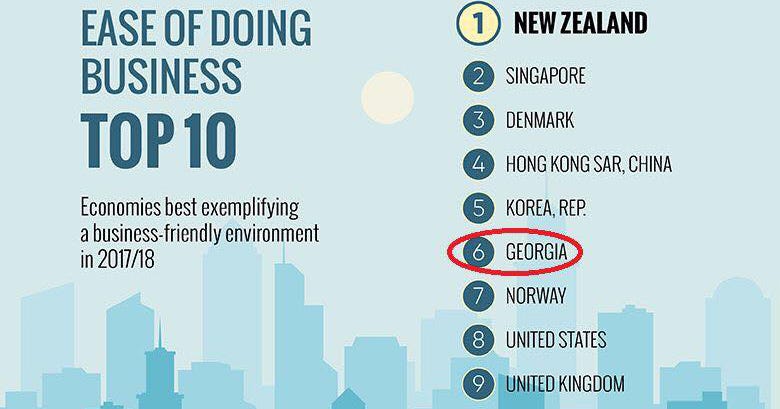Political Cooperation Highlights
In 2018, the US Congress initiated important resolutions and acts supporting Georgia’s territorial integrity and sovereignty, recognizing the country’s progress in European and Euro-Atlantic integration processes, and calling to expand the partnership in economic and security fields. Since 2017, US Congressional support to Georgia has been expanding, reaching highest point by approving Georgia Support Act by the end of 2018.
On June 26, the Co-Chairmen of the Georgia Caucus, US Congressman Ted Poe (R-TX) and US Congressman Gerald Connolly (D-VA) introduced the bi-partisan Georgia Support Act H.R. 6219. The act consists of provisions which reinforce and expand the unwavering support of the United States to Georgia and oppose the illegal Russian invasion and occupation of Abkhazia and South Ossetia/Tskinvali region. The bill calls for increased security assistance to Georgia to enhance the country’s deterrence, resilience, and self-defense. It requires the Secretary of State to develop a strategy to improve Georgia’s capabilities to combat Russian disinformation and propaganda campaigns. The act proposes sanctions on Russian actors in the occupied Georgian regions of Abkhazia and South Ossetia/Tskinvali region linked to serious human rights abuses. Additionally, the act addresses the U.S. Trade Representative to take measures to start negotiations on the Free Trade Agreement between the United States and Georgia. Georgia Support Act H.R. 6219 was unanimously adopted by the House of Representatives on in December of 2018, and will be reconfirmed in 2019. Congressman Poe presented Georgia Support Act supportive speech before the House floor on this occasion.
To further expand economic partnership between Georgia and the United States, a bi-partisan group of 29 U.S. Congressmen composed a letter in June, and Chairman of the House Georgia Caucus, Congressman Ted Poe (R-Texas) in October sent a separate letter addressing the U.S. Trade Representative (USTR) to initiate negotiations on a Free Trade Agreement with Georgia. This is an unprecedented request from Congress to elevate the Georgia-US partnership to a whole new level. While urging the USTR to deepen dialogue on high-level trade and investments with Georgia, the letter emphasizes the critical role of Georgia as a gateway to the economy of eight landlocked Central Asian countries with a market of 120 million people. In addition to economic expansion with the U.S., the letter applauds Georgia’s democracy building progress and its vigorous integration process into European and Euro-Atlantic institutions, confirming strong support from the United States of territorial integrity and sovereignty of Georgia.
In June on the occasion of Georgia’s Independence Day of May 26th, Congressman Poe made a strong supportive speech before the House floor, underlining Georgia’s one of the most valued partnership with the United States and the European community, and emphasizing importance of the United States to remain dedicated to upholding Georgia’s sovereignty, territorial integrity, and independence. “So that in another hundred years, we will still be standing side-by-side with a democratic and prosperous Georgia,” — reads his statement.
In June the United States Congress also introduced H.Res. 955 affirming US support to the nations of Ukraine, Georgia, and Moldova in their effort to retain political sovereignty and territorial integrity. The resolution urges the U.S. government, European allies, the United Nations, as well as other international partners of the United States to continue to pressure the government of the Russian Federation to uphold its international obligations. The initiation of the resolution coincided with the work visit to Washington of the chairmen of parliaments of Georgia, Moldova and Ukraine. The resolution enhances cooperation between the United States and the nations of Ukraine, Georgia, and Moldova, and calls for increased assistance to the Eastern European states in strengthening their capacity to resist the destabilizing activities of the Russian Federation, including in areas of defense and security. The bill opposes the Nord Stream II pipeline project in coordination with European allies, taking a mindful stance vis-a-vis the threat of this project to the security of Europe.
H.Res. 1030 was introduced in July, recognizing Georgia’s sovereignty and territorial integrity, and condemning the decision by the Syrian Arab Republic, which is a client state of the Russian Federation, to recognize the independence of the regions of Abkhazia and South Ossetia/Tskinvali region.
In 2018, the threat of Russia and its occupation of Georgian territories was again mentioned in the Consolidated Appropriations Act H.R. 1625.Phrasing “Occupation of Georgian territories” in so-called Omnibus Act, first took place in the Consolidated Appropriations Act in 2017 and was renewed the following year. The 2018 Omnibus Act condemns the Russian Federation for its unlawful actions in Georgia. This act prevents the central governments of nation states that have recognized the independence of Russian occupied territories Abkhazia and South Ossetia/Tskinvali region from receiving foreign aid from the United States. The act was passed by President Trump in March 2018.
Additionally, the US Senate passed its own version called the John S. McCain National Defense Authorization Act for Fiscal Year 2019 H.R.5515 NDAAwhich defines the policy and budgetary priorities of the US Department of Defense for the 2019 fiscal year. The 2019 NDAA refers to Georgia as a valuable friend and Ally and supports further Georgia-US cooperation.The document outlines that the US government should contribute robust security assistance for Georgia including lethal assistance, strengthening of defense capabilities and readiness of Georgia. The act calls for supporting Georgia in its quest to improve interoperability with NATO. The Senate once again affirms support for the open-door policy of NATO and calls on the US Government to make full use of NATO-Georgia Joint Training and Evaluation Center (JTEC).
As August 2018 marked the ten-year anniversary of Russia’s invasion and occupation of Georgia’s regions of Abkhazia and Tskhinvali Region/South Ossetia, the Commission on Security and Cooperation (CSCE) in Europe known as the US Helsinki Commission held a hearing in Congress on Russia’s occupation of Georgia and the erosion of the international order on June 17th with Ambassador David Bakradze, Damon Wilson of the Atlantic Council and Luke Coffey of the Heritage Foundation speaking on the humanitarian situation in the occupied regions, implication of Russian aggression for U.S. interests, and wider European and North-Atlantic security. All witnesses agreed that Georgia should be admitted to NATO as it has met or exceeded the benchmarks of a prospective member state. They recalled the alliance’s failure at its 2008 Bucharest Summit to extend membership invitations to Georgia and Ukraine that effectively signaled to Moscow NATO’s wavering commitment to the defense of these countries. In their opening statements, US Helsinki Commissioners affirmed the bipartisan, bicameral commitment in US Congress to Georgia’s territorial integrity and NATO aspiration.
To mark the ten-year anniversary of Russia’s invasion and occupation of Georgia’s regions of Abkhazia and Tskhinvali Region/South Ossetia, and significantly deteriorated Human Rights situation in occupied regions, Congressman Poe made a speech before the House floor and issued a press release about it. “10 years ago, Russian tanks rolled across the border into the independent nation of Georgia. I was there and saw the little green men with my own eyes… Ten years later, however, Moscow’s troops remain on Georgian territory. … They have committed horrific human rights abuses against the Georgian people, often harassing civilians and denying Georgians the ability to move about their country freely. … Following the collapse of the Soviet Union, Georgia emerged as a beacon of hope in a region full of turmoil and corruption. This is exactly why Russia invaded. Russia hoped to break this beacon of hope 10 years ago, but Georgia has remained defiant. We must be defiant with our friends to prevent further acts of aggression and hopefully begin to reverse Moscow’s deadly expansionism” — underlined the Congressman.
These resolutions and acts imply the continuation of unprecedented high level of support from the U.S. Congress to Georgia from previous year. Only in 2017, American legislators proposed and amended six notably important bills and resolutions, urging support of Georgia, and propose disciplinary measures including sanctions. After this unprecedented year of US-Georgia partnership, the support level in the U.S. Congress towards Georgia has increased. The political and security cooperation between the two countries has never been better and the support of US Congressmen toward a Free Trade Agreement between US and Georgia is yet unparalleled in these bilateral relations.
Defense and Security Cooperation Highlights
2018 was another outstanding year in Georgia-U.S. relations marked by high-level cooperation in support of Georgia’s total defense approach and Euro-Atlantic integration.
Most remarkable was the beginning of 2018 when Georgia received a long-sought after Javelin system which, in addition to filling a critical capability gap, was once again a testament that the U.S.-Georgia relationship is built on a solid foundation with increasing trust and partnership.
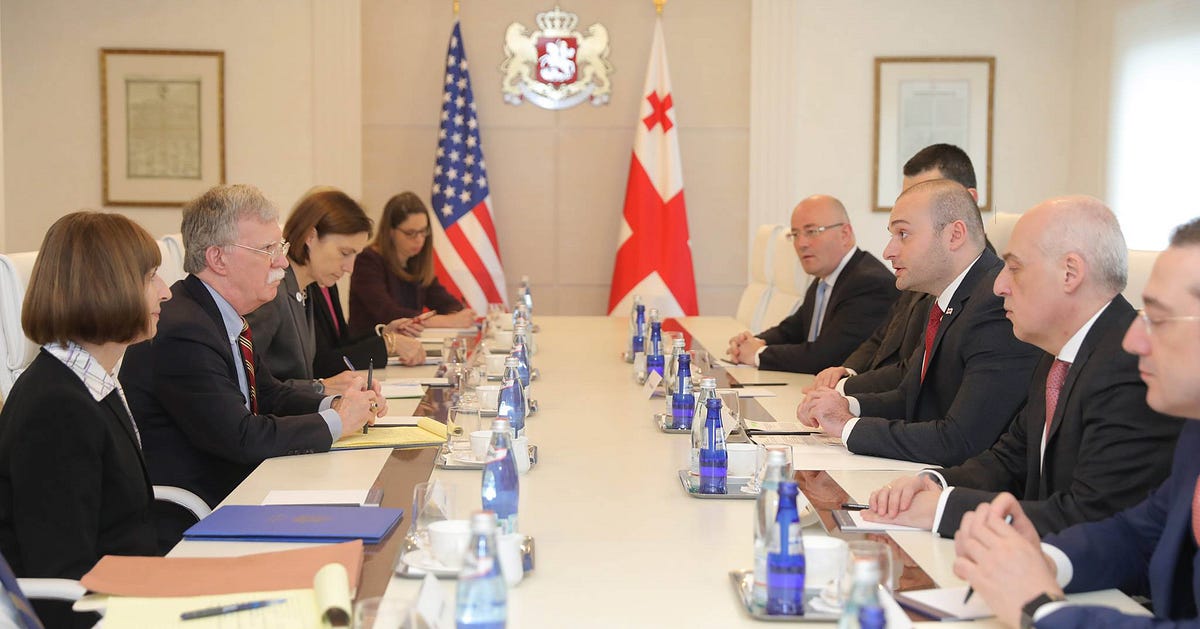

The many working and high level visits were a sign of continuous commitment to strengthening the bilateral strategic partnership. Amongst many important engagements, the most notable was the visit of National Security Advisor John Bolton, Gen. Curtis M. Scaparrotti, Major General Russell Sanborn Commander Marine Forces Europe/Africa, Stephen R. Lyons Transportation Commander and LTG Cavoli of CG US Army Europe. Minister Levan Izoria visited the U.S. in May 2018 and I co-chaired the U.S.-Georgia Strategic Partnership Commission Defense and Security Cooperation Working Group in October 2018.
In May, during his visit to Georgia, Gen. Scaparrotti announced the start of one the most ambitious bilateral Georgia Defense Readiness Program’s (GDRP) training initiative. In addition to tactical training, GDRP-I continues to develop systems and processes necessary for long term sustainment. Furthermore, GDRP-I will ultimately result in institutionalized readiness systems across the entire Georgian Defense Forces. By the completion of the program in 2021 Georgia will have a capacity to man, train, equip and sustain tactical forces at the readiness levels required to accomplish assigned national missions.
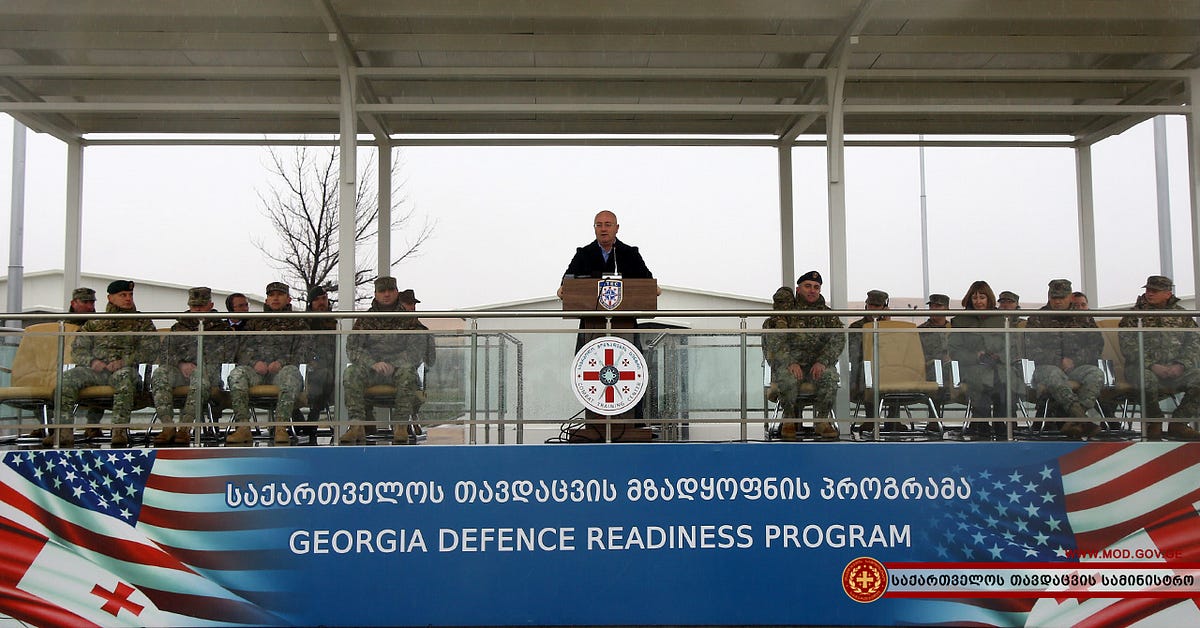

In parallel to developing territorial defense capabilities, Georgia continues to contribute to global peace and security. To further enhance Georgia’s pre-deployment training capabilities, the U.S. and Georgia have agreed to gradually transition Mission Rehearsal Exercise from Germany to Georgia. Both territorial and pre-deployment training capability development is supported by a separate but GDRP aligned CTC/JTEC development. CTC is to become the bedrock for the Georgia Defense Forces training management system preparing units for all national missions. Furthermore, flexible and interoperable CTC with its interconnected diverse training areas, fully instrumented systems and highly realistic environment will support multinational exercises, pre-deployment trainings as well as NATO Allies and partners to conduct their own readiness oriented trainings on a rotational bases in Georgia.
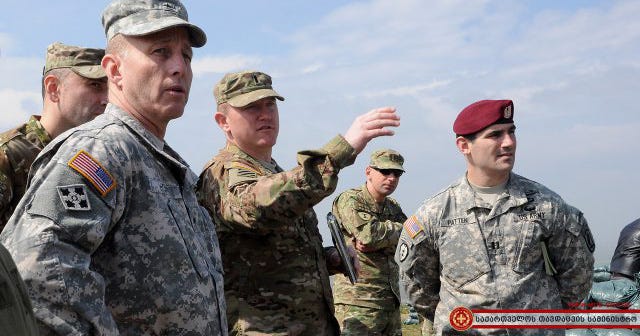

Exercise Noble Partner also contributed to making 2018 remarkable in U.S.-Georgia relations. It was the largest ever multinational exercise which enjoyed personnel and equipment participation from Europe and around region. In 2019, Georgia expects Agile Spirit 2019 to be as historic as Noble Partner 2018.
As a NATO aspirant country, Georgia has proven multiple times its significant contribution to common Euro-Atlantic security and is currently one of the top troop contributors engaged in the NATO Resolute Support Mission (RSM) in Afghanistan. Secretary of Defense James N. Mattis thanked Minister of Defense Levan Izoria for Georgia’s exemplary defense reforms and contributions to the NATO Resolute Support mission, reaffirming once more the long-standing defense relationship between the United States and Georgia.
Economic Cooperation Highlights
2018 brought a new wave of initiatives aimed at deepening bilateral relations in the field of economic cooperation. U.S. private sector engagement has increased in Georgia and in the region, bringing collaboration on the largest projects in the country, including the Anaklia Deep Sea Portdevelopment on the Black Sea, the PACE Terminal construction and operation in Poti and the Establishment of the American Hospital in Tbilisi.
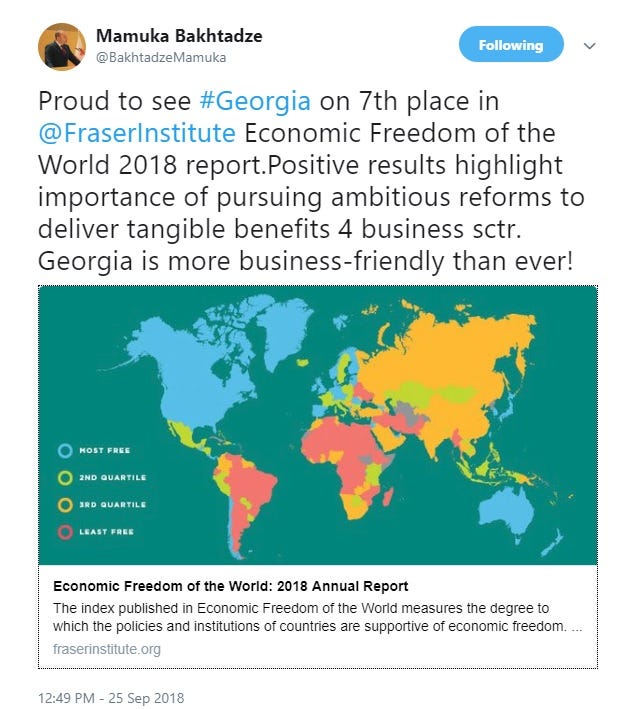

Georgia’s stability and economic growth highlight the country’s potential to evolve into a major regional business hub located at the center of the new Silk Road. Ranked 16th in the Index of Economic Freedom by the Heritage Foundation, 6th in the World Bank’s Doing Business ranking and enjoying preferable trade regimes with countries representing more than two billion people(including China, the EU, Turkey and Central Asian countries), Georgia is solidly advancing towards becoming a regional gateway for commerce.
Georgia continued to advance its cooperation with the U.S. Executive and Legislative branches towards strengthening bilateral trade relations, paving the way towards closer commercial ties between the nations.Strong bipartisan support was voiced through the letters, statements and the initiatives of U.S. congressmen supporting the possibility of a Free Trade Agreement between the United States and Georgia.
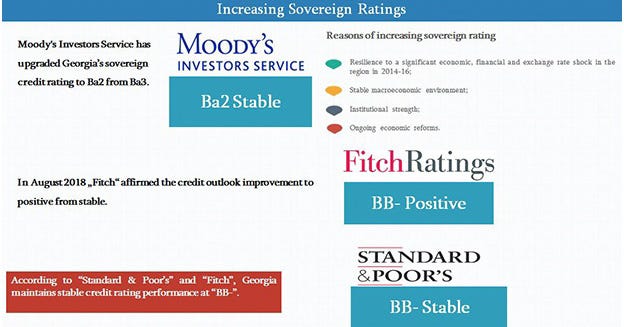

Since Georgia regained its independence in 1991, the U.S. has been a major partner in helping Georgia deepen its Euro-Atlantic ties and strengthen its democratic institutions. In May of 2018, Georgian Embassy, in partnership with the U.S. Institute of Peace and The Heritage Foundation hosted the 2nd Annual U.S.-Georgia Strategic Partnership Conference: 100 Years since the First Republic. The conference emphasized the importance of the bilateral relations between the United States and Georgia and placed an emphasis on exploring possibilities for the further strengthening of ties between the two nations. U.S. decision-makers, experts, scholars, and journalists focused on trends and challenges, and explored opportunities from a regional and international perspective.
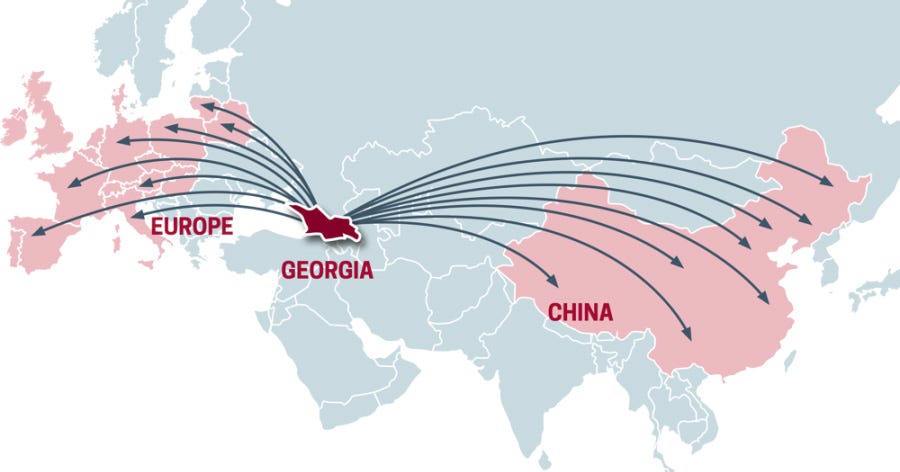

Emphasizing the importance of trade and transportation routes between Asia and Europe the Georgian Embassy in partnership with the Embassies of Afghanistan, Azerbaijan, Kazakhstan, Turkey, Turkmenistan, Uzbekistan, the Caspian Policy Center and the U.S. Chamber of Commerce hosted the3rd Annual Trans-Caspian Forum. Policy and Business leaders from the United States as well as the representatives of the Trans-Caspian countries discussed the economic and transportation potential of the region and underlined the importance of strengthening the transportation routes between East and West, fostering increase in trade, commerce, investment and security.
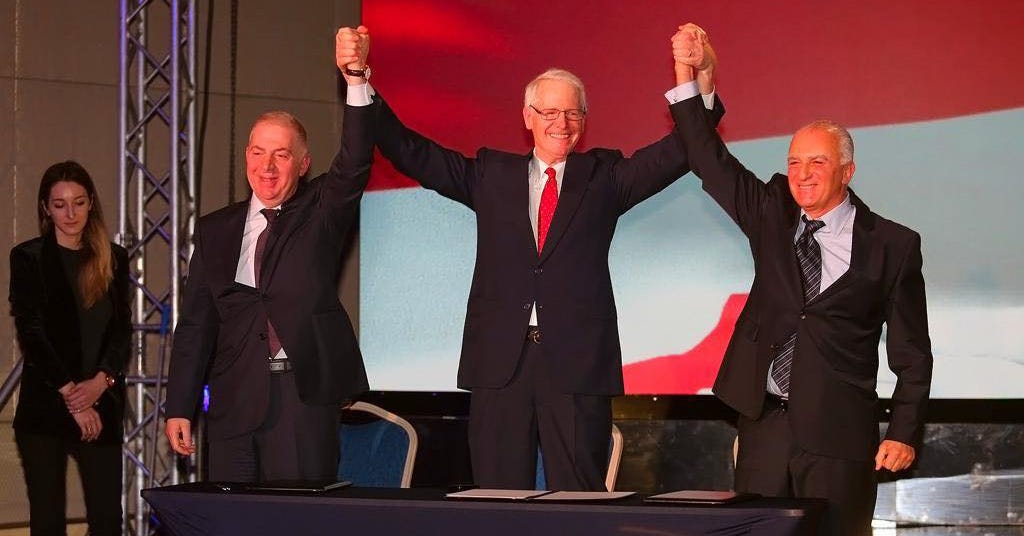

The Overseas Private Investment Corporation (OPIC) has selected a new project to finance in Georgia which will receive fifty million dollars for the development, construction and operation of the multifunctional marine terminal at the Port of Poti — PACE Terminal, developed by the Pace Georgia Limited.
The Embassy intensified targeted visits to different states in order to further increase cooperation with local governments and representatives of the business community as well as explore new initiatives for collaboration in the innovation, technology, manufacturing, agriculture and other fields. California, Washington, Massachusetts, Oklahoma, Louisiana, Texas, Virginia, Maryland, New York, Pennsylvania, Illinois, North and South Carolina and Florida were among the targeted states in 2018. The outreach has resulted in successful engagement of 6–7 projects with the cumulative investment amount of over 150 million dollars.


Embassy of Georgia also supported the implementation of the 1st Vino Forum of the United States in Washington D.C., which aimed to further advance the understanding of the origin of wine, the historical geopolitical and economic influence of wine for Georgia and in the region and the current role of the Georgian wine sector on the worldwide stage. The three day forum which was organized by the America-Georgia Business Council(AGBC) was attended by over six hundred people, including wine experts, journalists, sommeliers and wine enthusiasts from all over the United States.
